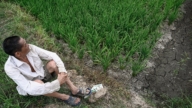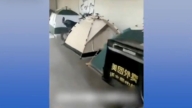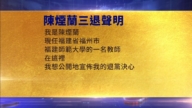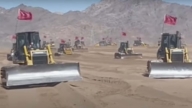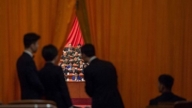【新唐人2013年07月10日訊】中共中央巡視組下地方尋找違紀違法的「老虎」和「蒼蠅」官員。可是,最近大陸網民卻高呼,巡視組官員,「國庫門前請止步」。還有網友對巡視組發出警告說:千萬別查軍隊的彈藥庫!尤其不能查核武庫。因為之前巡視組進駐調查的「中國儲備糧管理總公司」和「中國儲備棉管理總公司」,剛一查就發生大火。也有香港媒體提出「誰來監督巡視組?」的質疑聲音。請看以下報導。
5月27號,中共第一巡視組進駐「中儲糧」,31號,「中儲糧」黑龍江林甸糧倉突發蹊蹺大火,78個儲糧囤表面過火,5萬噸糧食被火焰親吻,損失過億。
「中儲糧」大火剛發生一個月後,7月1號,「中儲棉」山西侯馬代儲庫再次發生火災,10座棉庫,約3.6萬噸棉花,基本燃燒殆盡,損失達3億元。而當天,剛好是中共派出的45個巡視、督導組陸續到達各地。
這兩場突發的蹊蹺大火是巧合,還是預謀?巡視組、督導組,閉口不談,作為監管部門的中共物資儲備局,也沒去追責。但是,在網路上卻掀起了軒然大波,網民們呼籲:欽差們,國庫門前請止步,以免招致意外大火損失﹔也有網友發出警告:千萬別查軍隊的彈藥庫!尤其不能查核武庫,一查就炸。
北京時政觀察人士華頗指出,這反映出中國民眾對中共當局的不滿,尤其是對巡視組失望的情緒非常大,他們認為巡視組,不可能為他們解決實際問題,巡視只是一場「擾民秀」。
北京時政觀察人士華頗:「習近平派這些中央巡視組到地方,其實是中央和地方利益博弈而已,因為習要建立一個強勢的中央,要加強中央集權制,但是中央和地方在問題的看法上、觀點上,還有利益上產生了很大的分歧,所以他要讓地方服從中央,採取的一些方法,就是派巡視組下到地方,監視地方政府的一舉一動,給予地方政府一些壓力。」
大陸自由撰稿人劉逸明指出,巡查組到地方後,當地官員為了掩蓋真相,很可能會去製造一些事端,或毀滅一些爛賬或貪腐證據,真正的腐敗他們很難查到。不過劉逸明也不排除巡視組與地方當局沆瀣一氣,牟取私利。
大陸自由撰稿人劉逸明:「很多人知道有些官是貪官,但是畢竟沒有直接的證據,再則就算你有證據,你這個證據也不一定讓他們能夠看得到,比如,有人寫信給巡視組,你這個信件很可能會被地方截留,所以巡視組要想真正的打『老虎』、打『蒼蠅』,還是很不容易的。」
香港《東方日報》評論指出,被認為中共所謂反腐創新的中央巡視組推出十年,早已衍生為依靠巡視、監督,牟取私利的特殊利益集團,巡視組下不察民,上不督官,變成吃喝玩樂的「腐敗組」。
之前,曾有報導說,湖北省委13人的巡視組,到國家級貧困縣秭歸巡視20多天,花費80萬元。相當於200多名秭歸農民全年收入的總和。
華頗:「他們巡查組下去,可以說並不是解決人民群眾最關心、最直接的利益問題,解決不了,所以他們巡查組有一條規矩,就是不接受上查,所以,低層老百姓還是一個有冤無處伸,有問題無法解決。」
事實上,中央巡視組成立後,官場的腐敗並沒有減少,反而愈演愈烈,民間的上訪也沒有減少,反而愈來愈多。港媒還指出,中央巡視組領隊的正部級官員,大多數是退休的省市領導或者部長,有些人本身就與地方官有著千絲萬縷的利益關係,以巡視為名,牽線搭橋,買官賣官,甚至進行官商勾結。因此,讓他們去監督百官,簡直是與虎謀皮。
採訪編輯/李韻 後製/李勇
Netizens Don’t Trust Central Inspection Teams
The central Chinese Communist Party (CCP)
has sent working parties to different areas
of China, to investigate corruption officials.
However, netizens have called for a stop to the investigation.
Some netizens said, “Don’t check
the army’s ammunition depot!”
The netizens are referring to when previous working parties
investigated Sinograin and the National cotton repository.
Fires broke out. Hong Kong media questioned
who will be monitoring the working parties?
Let’s take a look.
On May 27, the first work team sent by central government
arrived at China Grain Reserves Corporation (Sinograin).
On May 31, there was a mysterious fire at Sinograin’s
depot in Lindian county, Helongjiang province.
Sources said the fire burned 78 barns containing
50,000 tons of grain.
The damage reportedly is as much
as over 100 million yuan.
On July 1, a month after Sinograin’s fire incident,
strange fire burned a National Cotton Reserves Corporation repository in Shanxi.
Around 36,000 tons of cotton and 10 storage units
were burned.
The damage was estimated at 300 million yuan.
Yet, on that day, 45 central work teams
were allocated to different places.
Are these two strange fires are just coincidence
or a conspiracy? The work teams kept silent.
The regulatory authorities National Material Reserve
Bureau didn’t launch any investigations.
However, the online netizens began a heated debate.
Some said, “Imperial officials, stop doing it to avoid
incurring big fire losses.”
Some netizens warned, “Don’t check army’s
ammunition depot!
especially don’t check nuclear weapon depot, otherwise,
once you check, it will trigger a big bang.”
Hua Po, Beijing current affairs observer, says that it reflects
that Chinese people are dissatisfied with the central government, particularly with central work teams.
The people think it is impossible for work teams to solve
practical problems, and are for show only.
Hua Po: “Xi Jinping sent work teams to local places,
struggling to gain the interest between central and local,
as Xi needs to establish a powerful central government
to strengthen a centralized power system.
However, disputes exist between central and local
authorities regarding opinions and interests.
Thus in order for the local authorities to obey the central,
they sent work teams out to monitor local governments’ every move, giving them pressure.”
Liu Yiming, writer in Mainland China, said local officials
likely create troubles so as to cover up their corruption,
destroying mass accounting or corruption evidence.
Liu analyzed that the possibility of work teams colluding
with local officials for personal gain.
Liu Yiming: “Many people know that some officials are
corrupt, but they didn’t have solid evidence.
Even if there is evidence, corrupt officials may
not let you obtain it.
For example, when people write to work teams,
the letters may be seized by local officials.
Thus it is unrealistic that work teams can really fight
‘tigers’ and ‘flies’.”
Hong Kong’s Oriental Daily comments that central work
teams, which were launched a decade ago, have become a special interest group.
During their “investigation,” they didn’t care about civilians,
neither to monitor officials. They became a corrupt team.
Not long ago, reports said that a 13-member work team
in Hubei went to an impoverished county to inspect for 20 days.
They spent 800,000 yuan, equivalent to more than
200 farmers’ annual income.
Hu Po: “They came, but they didn’t solve problems
that people are most concerned about and most related to.
They can’t resolve it.
The work teams have a rule that they don’t
investigate the higher up levels.
Thus, civilians still have nowhere to complain about
their mistreatment, their problems can’t be solved.”
In fact, since the central work teams were formed,
officials’ corruption hasn’t declined, but increased.
Appeals haven’t reduced,
but increasingly increased.
Hong Kong’s media also said that leaders of central
work teams are ministry-level.
The majority of them are retired provincial,
city-level or ministry-level leaders.
They are closely associated with local officials.
They used the name of “inspection” to build up networks,
sell or purchase official ranks, and collude with businessmen.
Thus is simply unrealistic to allow them to supervise officials.



